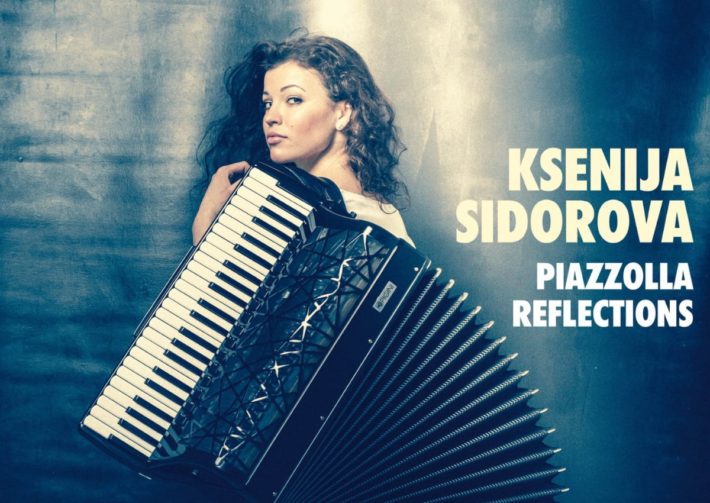Ksenija Sidorova is, according to her website, “the leading ambassador for the classical accordion.” She began lessons at the age of six, encouraged by a grandmother steeped in the Latvian folk music tradition. After several years of lessons in Riga, Ksenija moved to London, continuing her studies at the Royal Academy of Music, where she earned her undergraduate and graduate degrees. Her discography includes two recordings on the Champs Hill label of solo and concerto repertoire, as well as “Carmen,” released by Deutsche Grammophon in 2016. Each of these recordings showcases Sidorova’s wide-ranging repertoire, as does this new album on the Alpha label.
Sidorova opens with Piazzolla – “Chau Paris,” followed by Voïtenko’s “Revelation.” These contrasting pieces set the tone for the entire recording. Clearly a master of the instrument, Sidorova draws out an amazing variety of colors and textures from these pieces. She captures every subtle change in inflection, articulation, and mood: wistful and fragile one moment, sultry and lavish the next. “Revelation” (track 2), is some of the best playing on the album, Sidorova phrasing with captivating rhapsodic freedom, impressive dynamic control, and subtle shifts of color and weight to fully portray the forlorn, delicate ache of Voïtenko’s music.
Moreover, the joyful and sensitive interaction between Sidorova and the various musical partners is a tangible part of each performance. In “Histoire du Tango: Café 1930” (track 3) she becomes a perfect chamber partner, sharing the spotlight with the violin, here played with sensuous abandon by Alexander Sitkovetsky. Or in “Soledad” (track 8), listen to how these musicians work together to carefully build the music (6’00”) to it effusive climax. That same sense of chamber music connection is heard in Piazzolla’s “Concerto for Bandoneon & Orchestra.”
Related Classical Music Reviews
- Review: Vivaldi, Piazzolla – Four Seasons – Arabella Steinbacher
- Review: “Dear Mademoiselle” – Astrig Siranossian, Cello
- Review: “What’s Next vivaldi?” – Kopatchinskaja, Antonini
Premiered in Buenos Aires in December 1979 (with the composer as soloist), the work reveals three aspects of Piazzolla’s late compositional style. The first movement is built on driving repeated rhythms, reminiscent of Stravinsky and Bartok, while the slow second movement offers the soloist amply opportunity to revel in songful lyricism. The concluding Rondo brings a return to the opening movement’s energy, with a more overt focus on the propulsive rhythms of Piazzolla’s beloved tango. Lasting a little over twenty-minutes, the work is well crafted, its orchestration for strings and percussion, offering a wide variety of coloring that never overwhelms the soloist. While there are a number of moments in the outer movements where one is amazed by the virtuosity required to render the music’s fast, melismatic passages, I was particularly touched by the intimate atmosphere that develops between harp, violin, and accordion (track 6, 1’40”) in the slow movement.
The virtuosity, élan and expressiveness of this performance (featuring a surprisingly idiomatic accompaniment by the NDR Elbphilharmonie Orchester under Thomas Henglebrock) make a previous recording by Lothar Hensel and the German Chamber Academy Neuss under Johannes Goritzki (Capriccio) seem a trifle bland. Nevertheless, it should be acknowledged that the concerto was written for the bandoneon, not the accordion. If one wants a performance with the bandoneon, seek out Juan José Mosalini, accompanied by the Wurttembergische Philharmonie Reutlingen and Gabriel Castagna on Chandos. However, Sidorova’s performance better captures the essence of Piazzolla’s work.
Other highlights include a tenderly evocative transcription of the Adagio from Bach’s “Keyboard Concerto in D minor” (track 12), and a thrillingly infectious “Libertango” to conclude the album. Engineering throughout is uniformly impressive, even though the recordings come from three different sessions and locations. The program is intelligently designed, with a diversity of styles that allow Sidorova to display her complete mastery of her instrument. Warwick Thompson’s liner notes are engaging and informative. A highly enjoyable album.

“Piazzolla Reflections”
Ksenija Sidorova – Accordion
Alexander Sitkovetsky – Violin
Claudio Constantini – Piano
Claudio Constantini – Double Bass
Reentko Dirks – Guitar
Goldmund Quartet String Quartet
BBC National Orchestra of Wales
Clark Rundell – Conductor
NDR Elbphilharmonie Orchester
Thomas Henglebrock Conductor
Recommended Comparisons
Read more classical music reviews or visit The Classic Review Amazon store
Follow Us and Comment:
[social_icons_group id=”964″]
[wd_hustle id=”HustlePostEmbed” type=”embedded”]











